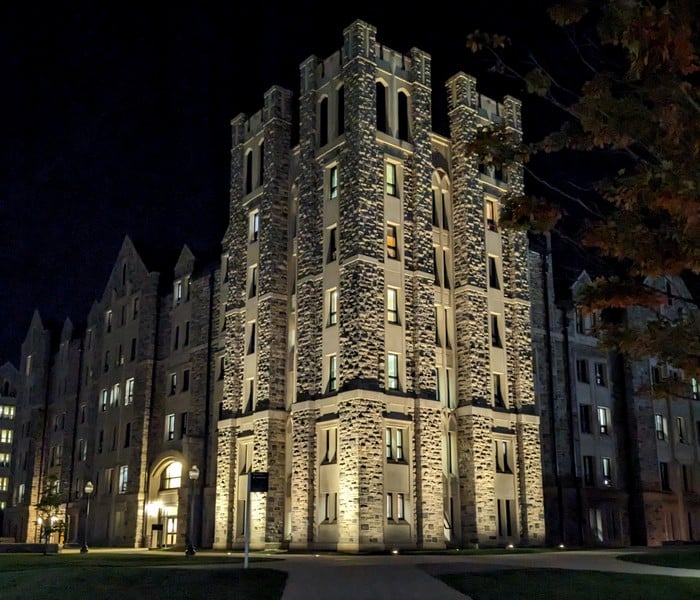Afterwords -- truth

"'For this purpose I was born and for this purpose I have come into the world—to bear witness to the truth. Everyone who is of the truth listens to my voice.' Pilate said to him, 'What is truth?'” (John 18:37-38)
October 7, 2023
Dear friends,
This week my reading in the Gospel of John happened to coincide with an on-campus forum, "Diversity and Free Expression: Can They Co-exist?" This campus event was a courteous and helpful conversation between the director of the Bradley Study Center and a university Vice Provost. Unfortunately, it did not draw a large attendance. But I'm glad to see conversation opening up in the university to allow more room to pursue truth, even to talk about controversial issues, with respect being shown to those who seek to understand the issues. It was good to hear a call for free expression in the pursuit of truth. (The audio of this conversation is available at the link given below.)
What follows are three observations about truth from the gospel of John, which is not an exhaustive treatment of this topic. Truth (Gr. ἀληθεία) and true (Gr. adj. ἀληθινός) appear in John over 50 times, thus it is a major theme in that gospel. From the biblical perspective, what is "true" is that which is genuine, real, and dependable. True words are those which are correct and reflect reality. True people have integrity and are trustworthy.
PURSUIT OF TRUTH. Truth is indeed something to be pursued. It is not something to be dismissed, denied, or made completely subjective. In the passage above Pilate responds to Jesus at his Roman trial. Pilate answers Jesus' statement, "for this purpose I have come into the world—to bear witness to the truth", with a dismissive shrug, saying, "what is truth?" Pilate's reaction is to not pursue the truth, which is ultimately not to love truth itself. Pascal wrote,
"Those who do not love the truth take as a pretext that it is disputed, and that a multitude deny it. And so their error arises only from this, that they do not love either truth or charity. Thus they are without excuse." (Pensées 261)
Truth is a light shining into a darkened world (John 1:9, 14, 17). And "...he who practices the truth comes to the Light, so that his deeds may be manifested as having been wrought in God." (John 3:21 NAS)
TRUTH DIVIDES. There are many sources of division (James 4:1-4), but truth itself, when it is presented, brings about division: "So there was a division among the people over him." (John 7:43) Chapter eight of John gives a lengthy record of a "Q & A session" in the temple, which reads more like a hostile press conference or a gathering of trolls disrupting Jesus' teaching. As much as we may try to speak the truth in love, there will always be some push-back (John 3:19-21; 8:32, 40, 44-46). Our sinful, fallen souls shrink from the light. It is inevitable. Truth must be proclaimed to draw others to Christ, but that same truth will offend others.
Again, Pascal asserts that reason and evidence are not enough to convince the heart of the truth of Christianity:
"The heart has its reasons, which reason does not know. We feel it in a thousand things. I say that the heart naturally loves the Universal Being, and also itself naturally, according as it gives itself to them; and it hardens itself against one or the other at its will. You have rejected the one and kept the other. Is it by reason that you love yourself?" (Pensées 277)
Opponents of Christianity reject Jesus not merely because of reasoning, or lack of evidence, but because they don't want him as he is in reality.
TRUTH IS PERSONAL. In the Gospel of John, truth is embodied in a Person: "I am the way and the truth..." (John 14:6). God himself is true (John 3:33; 17:3). This should lead us to embrace a personal relationship with God through his Son. This is the subjective dimension of truth, manifested in trust and obedience. Faith in the truth is more than believing that God's word is true, it is coming to him in humble dependence: "You search the Scriptures because you think that in them you have eternal life; and it is they that bear witness about me, yet you refuse to come to me that you may have life." (John 5:39-40) Just knowing correct information does not give us life unless we appropriate it personally. Christianity includes content (John 17:17), but it is more than content. As the gospel portrays it, embracing truth is "coming into the light," and gives us no room for pride or privilege.
----------
PRAYING FOR CHILDREN AND GRANDCHILDREN. We are rejoicing the birth of our newest grandchild (#7), a precious little girl! As mentioned in the last newsletter my wife and I are praying "31 Biblical Virtues" for our children and grandchildren. Here are the next seven:
8) Mercy -- "May my children always 'be merciful, as [their] Father is merciful'" (Luke 6:36).
9) Respect (for self, others, authority) -- "Father, grant that my children may 'show proper respect to everyone,' as your Word commands" (1 Peter 2:17a).
10) Strong, Biblical self-esteem -- " Help my children develop a strong self-esteem that is rooted in the realization that they are 'God's workmanship, created in Christ Jesus'" (Ephesians 2:10).
11) Faithfulness -- "'Let love and faithfulness never leave [my children],' but bind these twin virtues around their necks and write them on the tablet of their hearts" (Proverbs 3:3).
12) Courage -- "May my children always 'Be strong and courageous' in their character and in their actions" (Deuteronomy 31:6).
13) Purity -- "'Create in [them] a pure heart, O God,' and let their purity of heart be shown in their actions" (Psalm 51:10).
14) Kindness -- "Lord, may my children 'always try to be kind to each other and to everyone else'" (1 Thessalonians 5:15).
"31 Ways to Pray for Your Children" is here (PDF).
MISCELLANEOUS.
-- Here's the Bradley Study Center audio, "Diversity and Free Expression: Can They Co-exist?"
-- The issue of unchanging truth affects churches: "We draw circles, we don’t draw lines. We draw big circles." (Andy Stanley, as quoted by Albert Mohler)
-- "Science depends on the free and transparent exchange of information, as does our democratic system. Efforts to suppress or demonize contrary viewpoints undermine both the advance of knowledge and our ability to debate policy questions."
FINAL QUOTE. "Some people live their whole lives just around the corner from the world of truth." (Carl F. H. Henry)
That's it for this week!
Sandy
Photo above, entryway to Squires Student Center, Virginia Tech; below, Pearson Hall, new upper quad residence, Virginia Tech. Unless otherwise indicated, all Scripture quotations are from The ESV Bible (The Holy Bible, English Standard Version), copyright 2001 by Crossway, a publishing ministry of Good News Publishers. Used by permission. All rights reserved.
